Reconciliation Action Plan projects and initiatives implemented to date include:
- The renaming of Larni Barramal Yaluk and co-naming of Lalgambuk/Mt Franklin
- The Manna Gums Frontier War Memorial
- Formal support for the key principles of the Uluru Statement of the Heart
- Cultural awareness training for Council staff and the Community
- Recognition of Sorry Day
- Celebration of Reconciliation Week and NAIDOC Week.
- Commission of public art by Aunty Marilyne Nicholls- Dja Dja Wurrung Artist
- Increased Traditional Owner consultation with Council’s services, strategies, masterplans and overall vision for Hepburn Shire.
- Cultural Values Assessment of the Shire to inform Future Hepburn planning
- Djuwang Baring - 'Long track' naming of the Creswick mountain bike trails project
- Central Springs design collaboration with Council, landscape architect, contractor, DJANDAK and Dja Dja Wurrung Artist Timani Nicholls-Moore
Larni Barramal Yaluk - renaming of the creek
In April 2022, Council recommended changing the name of a creek which flows between Newstead and Hepburn from Jim Crow Creek to Larni Barramal Yaluk.
Council proposed the name change to:
- Recognise Aboriginal heritage and to reinstate the Dja Dja Wurrung language into the landscape,
- Remove a name that is offensive and derogatory. The term ‘Jim Crow’ is rooted in racial segregation and anti-black racism.
On 11 May 2023, Geographic Names Victoria gazetted the renaming of Jim Crow Creek to Larni Barramal Yalk.
Council has worked closely with the community and project partners Mount Alexander Shire Council, North Central Catchment Management Authority and DJAARA to campaign for the renaming of the creek over many years.
A ceremony was held at the Franklinford Streamside Reserve on 18 July 2023. This short video captures the celebration of partnerships and reconciliation at work.
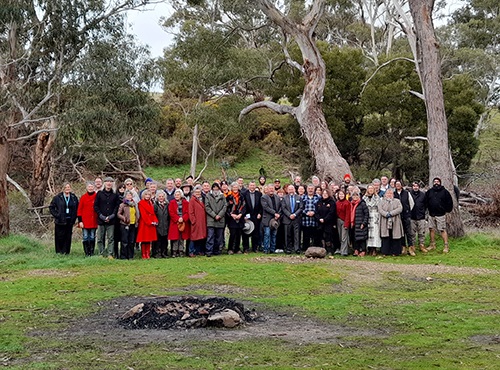
Franklinford Streamside Reserve on 18 July 2023.
Manna Gums Frontier Wars Memorial
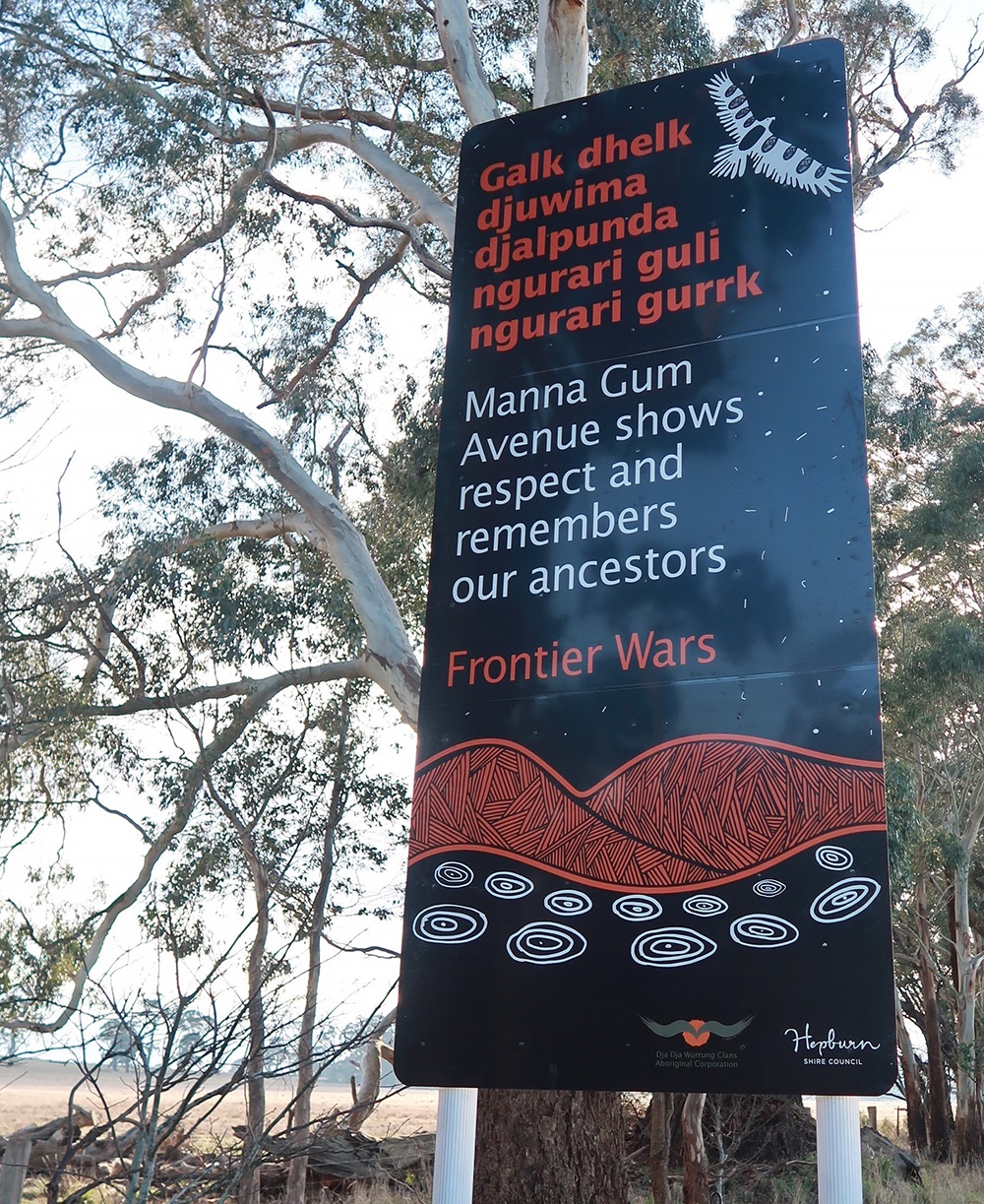
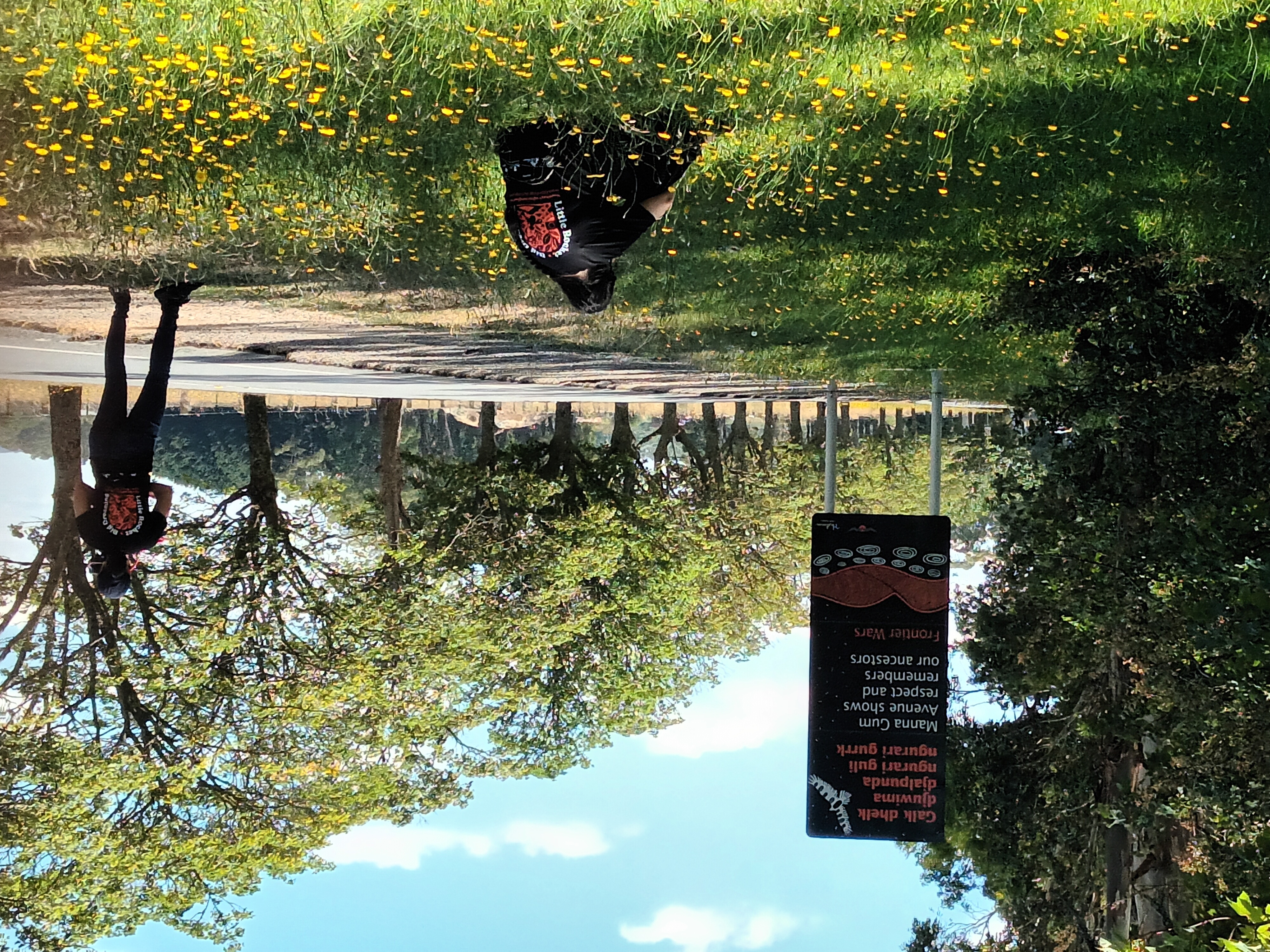
In July 2021, Council, in partnership with Djaara, opened the first Avenue of Honour to acknowledge Aboriginal lives lost in defending their traditional lands during early contact and ‘settlement’. The Memorial Avenue is on the Daylesford-Malmsbury Road near Coomoora.
The Manna Gums, along the Malmsbury-Daylesford Road in Daylesford, is the site for an Aboriginal Peoples Memorial Avenue, opened at the conclusion of NAIDOC Week 2021.
Cr Lesley Hewitt said the memorial was an opportunity to honour the loss of lives, the sacrifice and suffering inflicted on Aboriginal people during the frontier wars.
“This year’s NAIDOC theme is Heal Country and we hope this Memorial is a step forward in healing Country and healing people, acknowledging that the two are deeply connected.”
“Council is taking a leading role in honouring the lives and acknowledging the suffering of Aboriginal people in our region. Acts of reconciliation such as this, change attitudes to settlement and show a willingness to work together for a better future,” said Cr Hewitt.
The establishment of this Avenue of Honour is a public acknowledgement, the first of its kind in our country.
Rodney Carter, Dja Dja Wurrung Clans Aboriginal Corporation CEO, said “The Frontier Wars Memorial Avenue affords a greater recognition to our fallen Ancestors and helps us all heal”.
This is an initiative of the Hepburn Shire Council Reconciliation Action Plan Advisory Committee. The project was a Reconciliation Victoria Maggolee Self-Determination in Action Award winner.
Reconciliation videos
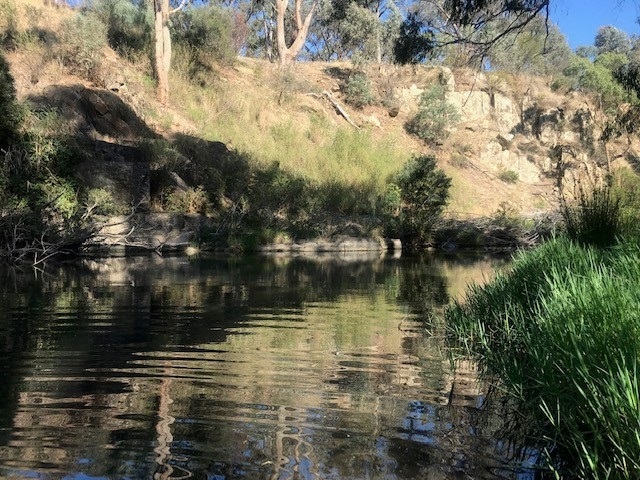
'Peaks, Rivers and Wetlands'
‘Peaks, Rivers and Wetlands’ is a three-part film series about truth telling and reconciling our shared history at contact. The films take viewers on a journey across the landscape with Djaara Elder Uncle Rick Nelson and Professor Barry Golding to environments and events from the early contact period that marked the beginning of unimaginable loss and trauma for Dja Dja Wurrung people.
An initiative of Council’s Reconciliation Action Plan Advisory Committee, ‘Peaks, Rivers and Wetlands’ was highly commended in the 2021 HART (Helping Achieve Reconciliation Together) Awards in the Local Government category.
Welcome to Country – Uncle Rick Nelson welcomes you on to Dja Dja Wurrung lands, to commence your Tour of ‘Peaks, Wetlands and Rivers’.
Peaks, Wetlands and Rivers - Part one Mount Greenock
Peaks, Wetlands and Rivers - Part two Merin Merin
Peaks, Wetlands and Rivers - Part three Loddon River at Neereman
The Coranderrk Portraits
Daylesford and District Historical Society, in partnership with DJAARA Elder Uncle Rick Nelson and Council, hosted an exhibition to showcase a set of portraits of Dja Dja Wurrung people photographed in 1866 at the Coranderrk Aboriginal Station. The photographs were generously made available by Uncle Rick Nelson and won the Australian Museums and Galleries Award in 2023 in the First Peoples Exhibition category.
'We’re getting our voice back' is a narrated short film, with Uncle Rick Nelson and Professor Barry Golding AM that will take you on a journey of truth, moving across the sites Neereman, Lalgambuk (Mount Franklin) and Coranderrk.
Produced by Daylesford Museum in partnership with Djaara Elder, Uncle Rick Nelson and Hepburn Shire Council.
Djuwang Baring
Council and DJAARA collaborated on the naming of the Creswick Trails Project, a network of mountain bike trails in Creswick. The trail will be known as Djuwang Baring meaning 'long track' in Dja Dja Wurrung language. Mayor, Cr Brian Hood commented "There has been extensive consultation with DJAARA during the development and activation of this project, bringing back language to country." Thirty five of the seventy tracks within the course have also been named in Dja Dja Wurrung language.

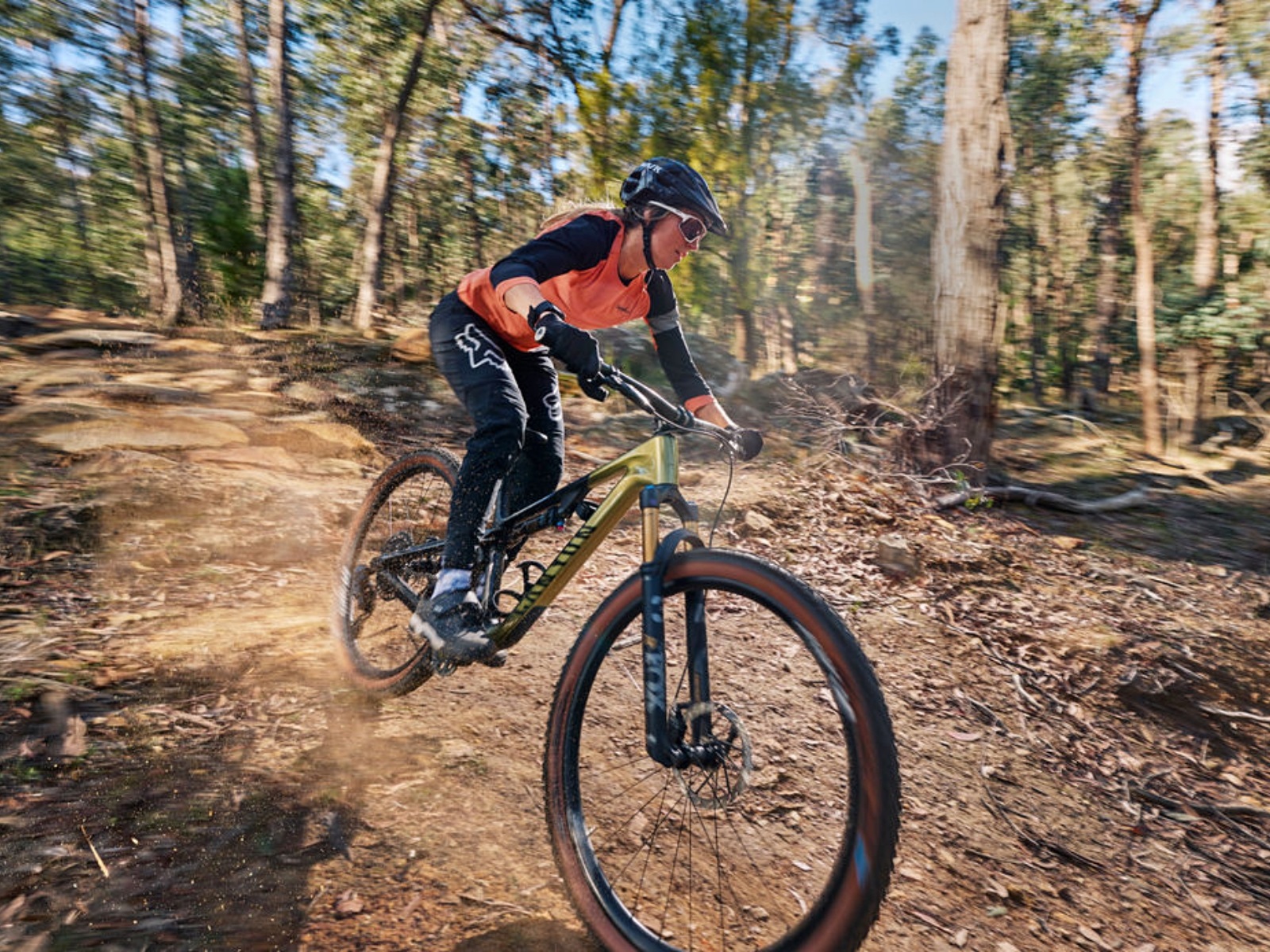
Central Springs at Hepburn

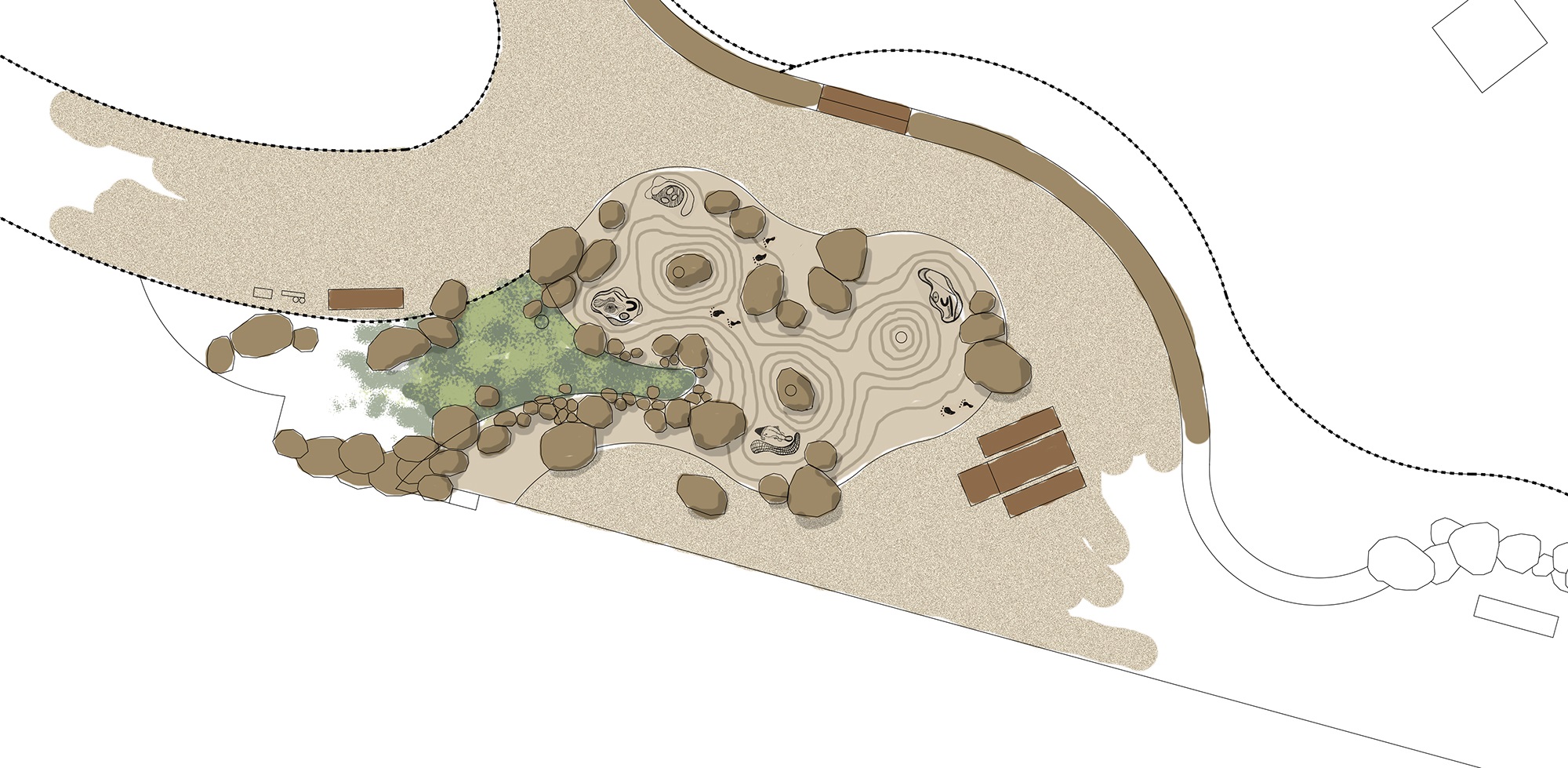
The design was informed by cultural information gathered at a Wartaka with Hepburn Shire Council, DJANDAK, Landscape architect Justine Image, and contractor Naturform, interpreted by the Dja Dja Wurrung artist Timani Nicholls.
Also informed by the Wartaka, was the setup of the mineral springs pump, designed to allow spilt mineral water to flow overland and into Wombat Creek. In a further development DJANKAC will construct a yarning circle as a part of the Balak Kalik Manya program, to compliment the work already delivered.
The Uluru Statement from the Heart
Tuesday 16 August 2022, Council unanimously passed a motion to support the Uluru Statement from the Heart.
The motion put forward by Cr Lesley Hewitt;
That Hepburn Shire Council supports the Uluru Statement from the Heart and requests the Chief Executive Officer and Mayor to write to our local Federal Member of Parliament noting the recent announcement from the Prime Minister that there will be a referendum to support Constitutional Recognition for Aboriginal and Torres Strait Islander peoples and noting our support for the key principles of the Uluru Statement from the Heart.
The Uluru Statement from the Heart is an invitation to the Australian people from First Nations Australians. It asks us to walk together to build a better future by establishing a First Nations Voice to Parliament enshrined in the Constitution.
Read the statement here - The Statement - Uluru Statement from the Heart.
Voice to Parliament
Council has formally stated its unanimous support for the constitutional recognition of Aboriginal and Torres Strait Islander peoples through the Voice to Parliament. This stance is consistent with Council’s position to support the Uluru Statement from the Heart in August 2022.
Council adopted the following motion:
That Council:
1. In recognition of the position advocated by the Dja Dja Wurrung Clans Aboriginal Corporation and consistent with the Council motion of August 2022 supporting the Uluru Statement from the Heart, formally supports constitutional recognition of Aboriginal and Torres Strait Islander Peoples, through a Voice to Parliament enshrined in the Australian Constitution;
2. Commits to sharing clear, credible information on the Voice to Parliament and all aspects of the upcoming referendum to assist residents in making their own considered and informed choice on the day; and
3. Acknowledges that any position resolved by Council is without prejudice to individual position each Councillor, or Council officer, may privately or publicly pursue.
Read more about the Voice to Parliament.